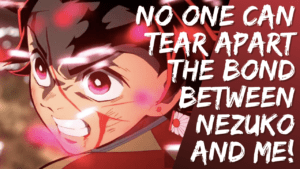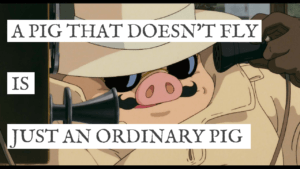Let’s learn Japanese with Hodaka’s quote from Weathering With You (天気の子, Tenki no Ko).
CONTENTS
Video
Hodaka’s Quote
Japanese: もう二度と晴れなくたっていい!青空よりも俺は陽菜がいい!天気なんて狂ったままでいいんだ!
Romaji: mō nido to harenakutatte ii! aozora yori mo ore wa hina ga ii! tenki nante kurutta mama de ii n da!
English: Who cares if we don’t see the sunshine ever again? I want you more than any blue sky! The weather can go crazy!
Analysis
もう二度と晴れなくたっていい
もう (anymore) 二度 (twice) と means “ever again”. It’s used with a verb negative form to show that it’s not going to happen again.
晴れなくたって means “even if the sky doesn’t clear up”. 晴れない is the negative-form of the verb 晴れる meaning “(the sky) clears up”. To make this grammar, you just need to remove the い in the end of the negative-form and attach くたって.
いい means “fine” so もう二度と晴れなくたっていい directly means “it’s fine even if the sky doesn’t clear up ever again” which can be rephrased as “the sky doesn’t have to clear up ever again” or “Who cares if we don’t see the sunshine ever again?”
青空よりも俺は陽菜がいい
AよりもBがいい means “B is better than A”. よりも indicates the object to compare with and いい with the particle が is used to express one’s preference or hope, so it can be translated as “one likes B more than A” or “one wants B more than A”.
The A is 青空 meaning “blue sky”, the B is 陽菜 which is her first name, and the topic is 俺 meaning “I” used by men as the topic particle は is attached.
So 青空よりも俺は陽菜がいい means “I like Hina more than blue sky” or “I want you more than any blue sky”.
天気なんて狂ったままでいいんだ
天気 means “weather”.
なんて means “something like” which is used to express the speaker’s negative feelings towards the preceding word. So it shows the weather is not important for him.
Verb Ta-Form followed by まま is used to express a certain situation remaining the same. 狂った is the ta-form of 狂う meaning “to go crazy”, so 狂ったまま expresses the unchanged situation after going crazy.
Noun でいい means “fine with something”.
んだ is used when persuading someone. It could be used in the end of all these sentences but it would be repetitive so it’s only used in the last sentence.
So 天気なんて狂ったままでいいんだ means “it’s fine with the weather being crazy”, “I don’t care about the crazy weather” or “The weather can go crazy”.
Examples
〜なくたっていい (don’t have to)
そんなに考え込まなくたっていいよ。気楽にね。
sonna ni kangae koma nakutatte ii yo. kiraku ni ne.
You don’t have to think so seriously. Take it easy.
勉強したくないなら、しなくたっていい。
benkyō shitaku nai nara, shi nakutatte ii.
If you don’t want to study, you don’t have to.
あいつの言うことなんか、聞かなくたっていい。
aitsu no iu koto nanka, kika nakutatte ii.
You don’t have to listen to what he says.
When you want to say “it’s fine even if one DOES something” (= one can do something), use a verb ta-form and attach っていい which is more colloquial than 〜てもいい.
雨が降ったっていい。
ame ga futta tte ii.
It’s ok even if it rains.
(more colloquial than 雨が降ってもいい)
AよりもBがいい (B is better than A)
朝は紅茶よりもコーヒーがいい。
asa wa kōcha yori mo kōhī ga ii.
I want coffee more than tea in the morning.
住むなら、都会よりも田舎がいい。
sumu nara, tokai yori mo inaka ga ii.
I prefer living in the countryside over the city.
渋滞するから、車よりも自転車通勤がいいよ。
jūai suru kara, kuruma yori mo jitensha tsūkin ga ii yo.
There is a lot of traffic, so bike commuting is better than car.
- も can be omitted as it’s only used for emphasis.
- AよりもBの方がいい emphasizes “comparison”.
Verb Ta-Form + まま (expresses a certain situation remaining the same)
その時計は長い間、壊れたままだった。
sono tokei wa nagai aida, kowareta mama datta.
The clock remained broken for a long time.
ドアは開けたままでいいよ。
doa wa aketa mama de ii yo.
You can leave the door open.
電気をつけたままで寝ないで。
denki o tsuketa mama de nenai de.
Don’t sleep with the lights on.
It can also be used as a conjunction meaning “while doing something” or “in a certain state”.
Noun + でいい (fine with …)
飲み物は何がいい?お水でいい?
nomimono wa nani ga ii? omizu de ii?
What do you want to drink? Are you fine with water?
明日のパーティーはカジュアルな服装でいいよ。
ashita no pātī wa kajuaru na fukusō de ii yo.
Casual fashion for tomorrow’s party is fine.
急いでないから、後でいいよ。
isoide nai kara, ato de ii yo.
It’s not urgent so later is fine.
Support Easy Peasy Japanesey
If you enjoy our content, please consider supporting Easy Peasy Japanesey. Your support will help keep us going. Thanks for all your support!



Thanks for the videos, sensei.
I’m from Brazil and I’m studying Japanese by myself.
After 3 months learning only basic grammar with just free content (on Youtube and Websites) I feel able to understand your lessons very well, and I really enjoy them.
本当ありがとう。
You’re very welcome! Glad you enjoyed our videos. Keep up with your studies and hope you learn more with our videos.